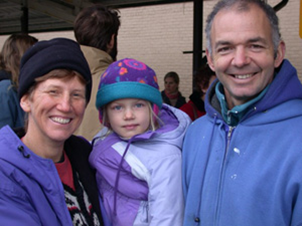Another Regional Food Hub Hits the Michigan Scene
What could you do with 16 acres of farmland and commercial buildings in the city limits of Ann Arbor, surrounded by families and chefs hungry for local food?

By Patty Cantrell, Regional Food Solutions
What could you do with 16 acres of farmland and commercial buildings in the city limits of Ann Arbor, surrounded by families and chefs hungry for local food?
Chelsea farmer Richard Andres ticks off a list of possibilities: A retail destination that could include a U-pick farm, a cooperative of local farmers combining their products to serve larger-scale wholesale demand, and more.
But Andres, whose Tantré Farm is a busy commercial organic operation including 350 Community Supported Agriculture shares, is not just dreaming. He and partner Deb Lentz recently bought the property and, together with a broad and active base of community volunteers, are in the process of developing the “Washtenaw Food Hub.”
“The idea is to give a little purchase to some smaller farmers so we can get together and have more access to markets, either as a retailer at this site or through wholesale distribution,” he said. “The structure and model of this is cooperative and communal and local.”
The Washtenaw Food Hub joins a growing cadre of food hub efforts across the state, all focused on bridging gaps in food distribution and processing, which smaller, regional market-oriented farms face. The carrot urging these determined community-based efforts on is strong demand for local foods, including more schools and hospitals prioritizing such purchasing for economic development and health benefits. Last year, for example, half of all hospitals in Michigan pledged to source 20 percent of their food from Michigan-grown sources by 2020.
In the Upper Peninsula, the Marquette Food Cooperative will make storage and distribution space available for local farms as part of its upcoming move into a larger facility. In the Traverse City area, a business planning effort is underway for a hub at the city’s historic Grand Traverse Commons property.
In Grand Rapids, city and civic leaders are nearing their fundraising goal for a year-round urban market downtown. In southwest Michigan, the board of the Benton Harbor Fruit Market recently purchased land that it plans to develop into a retail and wholesale hub for products from that region’s fruitful farmland.
Something big is happening with the emergence of food hub projects across the state, despite (or because of) all the gaps in market infrastructure that now keep much of the potential for Michigan farms in the pending column versus actual sales.
“We need to increase supply to meet market demand,” Andres said. “But we also need to increase marketing and distribution; we need to innovate and have a place to come together to innovate. The Washtenaw Food Hub project is that place for us.”



 Print
Print Email
Email